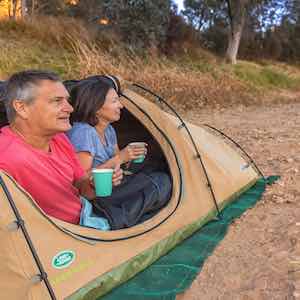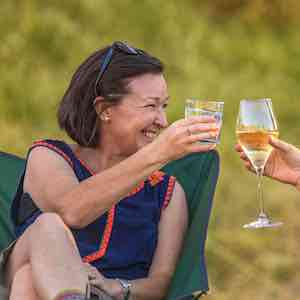FAQ
FREQUENTLY ASKED QUESTIONS
Central Australia is a desert environment. Winter days (June to August) can be mild with temperatures dropping below zero Celsius at night while summer (December to February) days can reach 40 Celsius. Generally, night time temperatures are around 20 degrees Celsius lower than the day time high. The below chart shows monthly averages.
With temperatures ranging from zero to forty degrees Celsius, it is important to pack according to the season. Winter nights and early morning can be cold. Refer to the above question regarding annual temperature averages, and pack for comfort. Good walking shoes are required.
Most tours do require a moderate level of fitness. We are happy to mould itineraries around individual capabilities or special needs, so please don’t hesitate to ask.
We will do our utmost to cater for any food preferences or allergies. Advance notice is required for planning purposes.
 In true outback style, comfortable ARB Dome Swags are used. These swags are very comfortable and spacious and keep the canvas off your body. The roof can be zipped back so you can enjoy the night sky or closed for warmth and privacy. They are available in single or double. We use cotton sheets inside an ARB sleeping bag.
In true outback style, comfortable ARB Dome Swags are used. These swags are very comfortable and spacious and keep the canvas off your body. The roof can be zipped back so you can enjoy the night sky or closed for warmth and privacy. They are available in single or double. We use cotton sheets inside an ARB sleeping bag.
Each tour is supported by a team based in Alice Springs. Daily contact is maintained via satellite phone on remote travel to ensure that our location and tracking is known. In case of any medical emergency, your guide has a first aid certificate as a first respondent with the Royal Flying Doctor servicing the region for any serious issues.
A SPOT Tacker is also carried that provides our location more frequently to ground staff in Alice Springs. This device has the added ability to send an emergency signal if required.
Most tours depart Alice Springs which has ample mobile coverage and many free Wi-Fi hotspots throughout town. Once you leave city limits, mobile reception is not available, apart from a handful of larger communities.
A satellite phone is carried on all expeditions in case of any emergencies.
A satellite phone is carried on all expeditions so communication with medical experts is a phone call away. Your trip leader holds a current first aid certificate for any instances requiring immediate attention.
We always carry more water than necessary as the dry desert conditions can be dehydrating. We ensure that plenty of drinking water is available and will monitor personal intake to ensure our guests' safety.
Travel insurance is always recommended for any travel you do. It can not only protect you against any issues while on tour, but also on the lead up to your travel.
We allow, and encourage children to join in the expeditions, they are normally the keenest of explorers. There are certain precautions that need to be taken in relation to personal safety but this is the case for all participants. Feel free to contact us if you have any concerns.
As the tours generally travel through remote locations, it is challenging to carry enough water for a shower. Limited water for washing will be provided and we carry a healthy supply of Wet Wipes (aka bush bath).
In regards to toilet facilities, a bush toilet will be erected. While this is not what you would get in a hotel, it is quite comfortable and private. We will stop at any bathrooms that we come across in our journeys.

